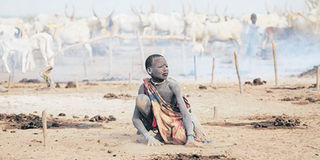Facing the demon in a place that has no leader, no hope

A look at Africa reveals rising problems that make it difficult for citizens to be optimistic about their immediate future, thanks to poor leadership. PHOTO I FILE
What you need to know:
- The announcement marked the second year in a row that the foundation had not deemed it apt to honour any former African head of state and government with the $5 million (Sh11 billion) award.
Dar es Salaam. Last Tuesday, the Mo Ibrahim Foundation announced once again that there was no suitable winner of the 2016 Ibrahim Prize for Achievement in African Leadership.
The announcement marked the second year in a row that the foundation had not deemed it apt to honour any former African head of state and government with the $5 million (Sh11 billion) award.
For many people across the continent the news came as a no-surprise at all. From the East to the South, North to the West, there is crisis all over the continent, and Africa is suffering mainly because of bad governance.
In his masterpiece The trouble with Nigeria, Chinua Achebe sums it all up in the following line: “The trouble with Nigeria is simply and squarely a failure of leadership. There is nothing basically wrong with the Nigerian character. There is nothing wrong with the Nigerian land or climate or water or air or anything else.”
It’s a book of frustration – of what could be termed as the African condition. Chinua Achebe spelt out, without playing around with proverbs and such flowery manner of speech, the reasons why Nigeria, and perhaps most African countries, are facing such immense and seemingly unsurmountable developmental challenges.
In ‘Where the Problem Lies’, the author specifically identified and attributed the problem. He writes the problem with Nigeria is simply and squarely a failure of leadership.
A look at Africa reveals rising problems that make it difficult for citizens to be optimistic about their immediate future, thanks to poor leadership.
The past three weeks, for instance, have seen an ugly, humiliating thing happening in South Africa; a country once considered a jewel of democracy on the African continent has been gripped by a wave of xenophobic violence.
In a matter of days, more than 30 stores belonging to foreign nationals were shut down after intense attacks and looting by locals in several townships.
The fresh spate of xenophobia is again blamed on the internal refugee crisis. It is a case of the poor fighting the poor as foreign nationals are increasingly under serious threat.
Fuelled by mounting unemployment in the country, the rabid xenophobia has resulted in a flare-up of attacks on foreign-owned residences and businesses in different locations around the country.
This is not the first time that foreigners have faced attacks in South Africa’s townships and provinces. In 2008, the country’s streets were ablaze, literally, with violence against foreigners.
Perhaps it reflects the complex truth about South Africa’s xenophobia — that it is never just a rejection of a different identity but also a lament for the economic exclusion experienced by black South Africans, or all black Africans, for that matter.
The acts of violence are specifically targeted at African and Asian migrants. White migrants are safe. They own businesses and property and generally go about their lives peacefully. They are seen as providers of work and capital, but black ones are seen as encroachments and threats.
They are from the margins of our society, and even the language used to describe them — illegal immigrants, illegal aliens, outsiders — creates an “us and them” dynamic. They are dirty, they are criminals, they are drug peddlers — common accusations that are articulated boldly on radio and television.
Anti-foreigners march
Even more disturbing is the recent registration of South African First, an explicitly xenophobic political party, and the staging of an anti-foreigners march in the capital Pretoria by so-called “concerned citizens”.
For starters, the refugee crisis that has for years become the bane of the continent has worsened in recent times, with more and more mass drownings in the Mediterranean Sea as disillusioned Africans try to reach Europe.
Ironically, the same Europe has become averse to opening its doors to desperate African immigrants, and has ratcheted up measures to send them back to their countries if they survive desperate journeys across the sea.
Camps ‘overstretched’
There have been media reports that refugee camps in Tanzania are “overstretched” as a result of an influx of thousands of Burundians, who constitute over three quarters of the refugees in Tanzania.
The Burundian refugees have been fleeing the insecurity in their troubled country, and with reported daily arrivals of a staggering 600-1,000 people, it is expected that the Tanzanian refugee camps will be overwhelmed by April if the current daily arrivals continue.
The alarming refugee crisis in Tanzania comes amid reports by the medical charity Médecins Sans Frontières that a health crisis is looming in the massively overcrowded refugee camps.
Refugee problems aside, many African countries have in recent times had to contend with prolonged droughts that have left millions starving and sometimes dying from hunger.




